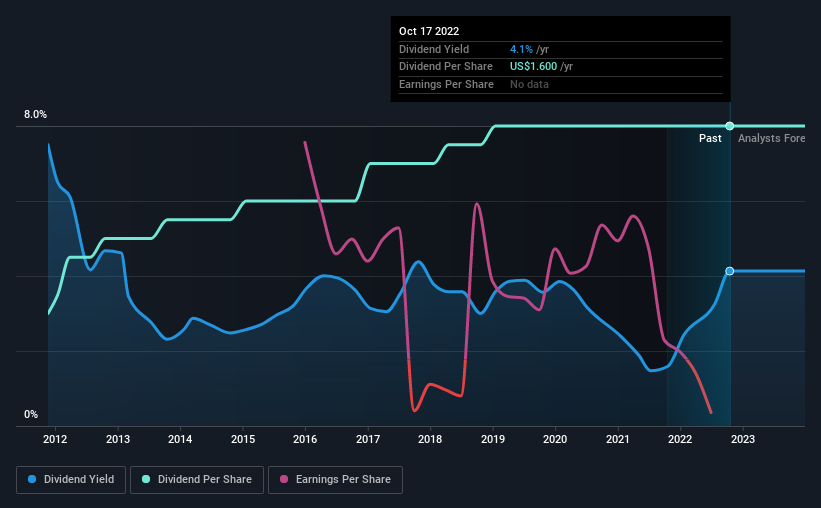
HCI Group, Inc. (NYSE:HCI) will pay a dividend of $0.40 on the 16th of December. This makes the dividend yield 4.1%, which will augment investor returns quite nicely.
While the dividend yield is important for income investors, it is also important to consider any large share price moves, as this will generally outweigh any gains from distributions. HCI Group's stock price has reduced by 42% in the last 3 months, which is not ideal for investors and can explain a sharp increase in the dividend yield.
Check out the opportunities and risks within the US Insurance industry.
HCI Group's Distributions May Be Difficult To Sustain
We like to see robust dividend yields, but that doesn't matter if the payment isn't sustainable. HCI Group is unprofitable despite paying a dividend, and it is paying out 117% of its free cash flow. This makes us feel that the dividend will be hard to maintain.
Looking forward, earnings per share could rise by 2.8% over the next year if the trend from the last few years continues. This is the right direction to be moving, but it is probably not enough to achieve profitability. Unfortunately, for the dividend to continue at current levels the company definitely needs to get there sooner rather than later.

HCI Group Has A Solid Track Record
Even over a long history of paying dividends, the company's distributions have been remarkably stable. Since 2012, the dividend has gone from $0.60 total annually to $1.60. This works out to be a compound annual growth rate (CAGR) of approximately 10% a year over that time. So, dividends have been growing pretty quickly, and even more impressively, they haven't experienced any notable falls during this period.
Dividend Growth May Be Hard To Achieve
Some investors will be chomping at the bit to buy some of the company's stock based on its dividend history. Earnings have grown at around 2.8% a year for the past five years, which isn't massive but still better than seeing them shrink. With no profits, we don't think HCI Group has much potential to grow the dividend in the future.
HCI Group's Dividend Doesn't Look Sustainable
Overall, we don't think this company makes a great dividend stock, even though the dividend wasn't cut this year. We can't deny that the payments have been very stable, but we are a little bit worried about the very high payout ratio. We would probably look elsewhere for an income investment.
Companies possessing a stable dividend policy will likely enjoy greater investor interest than those suffering from a more inconsistent approach. Still, investors need to consider a host of other factors, apart from dividend payments, when analysing a company. Just as an example, we've come across 2 warning signs for HCI Group you should be aware of, and 1 of them can't be ignored. Looking for more high-yielding dividend ideas? Try our collection of strong dividend payers.
Valuation is complex, but we're here to simplify it.
Discover if HCI Group might be undervalued or overvalued with our detailed analysis, featuring fair value estimates, potential risks, dividends, insider trades, and its financial condition.
Access Free AnalysisHave feedback on this article? Concerned about the content? Get in touch with us directly. Alternatively, email editorial-team (at) simplywallst.com.
This article by Simply Wall St is general in nature. We provide commentary based on historical data and analyst forecasts only using an unbiased methodology and our articles are not intended to be financial advice. It does not constitute a recommendation to buy or sell any stock, and does not take account of your objectives, or your financial situation. We aim to bring you long-term focused analysis driven by fundamental data. Note that our analysis may not factor in the latest price-sensitive company announcements or qualitative material. Simply Wall St has no position in any stocks mentioned.
About NYSE:HCI
HCI Group
Engages in the property and casualty insurance, insurance management, reinsurance, real estate, and information technology businesses in the United States.
Outstanding track record with excellent balance sheet and pays a dividend.
Similar Companies
Market Insights
Community Narratives



